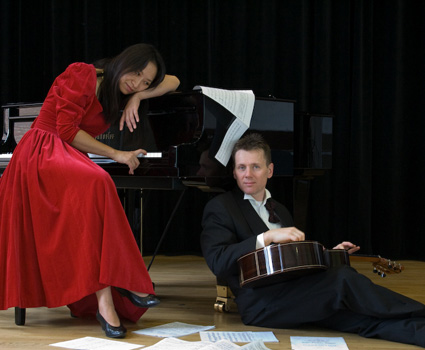Colin Tribe’s new book offers new possibilities for ukulele players who aspire to fingerpick their way through thirty of the most popular songs of all time. These chord melody arrangements show a variety of ways the high G ukulele can be used for instrumental solo or duet (such as chord accompaniment and melodic fingerpicking) . Whether reading notation or tablature, fingerpicking is not for the faint-hearted. The book is well suited for intermediate and advanced players hungry for interesting arrangements that stretch the limits of the high G ukulele.
Continue reading “REVIEW: Discovering Fingerstyle Ukulele Songbook by Colin Tribe”Tag: recordings
Ukulele Melee 2018
The first time I saw the name of the festival “Ukulele Melee” I thought there was a typo or misspelling. I knew that “mele” was the word for music in Hawaiian. What then was “melee”?
“Melee” means a confused fight or mass of people, a word that originated from 1640 French mêlée and Old French meslee meaning “brawl, confused fight; mixture, blend.” It wasn’t until the one-hour drive to the festival in Hamilton, Massachusetts that morning of Friday 27th April that I learned the origins of the festival name.
Music dead or alive
Choosing musicians to play live music seems costly, time-consuming, and risky. Meanwhile, there’s more variety to choose from in recorded music, lower cost, and less risk that something will go wrong. If musicians are to be chosen over ipod, CD players, and tape decks, we need to lower the transaction costs and risks in getting hired.
“Due to budget constraints, let’s get a DJ instead of musicians.”
When I heard the comment from a fellow Rotarian, I suddenly understood how people decide on music for a party, wedding, funeral, and other occasions. Choosing musicians to play live music seems costly, time-consuming, and risky. Meanwhile, there’s more variety to choose from in recorded music, lower cost, and less risk that something could go wrong.
As a performer, it breaks my heart to see people opting for recorded music instead of hiring musicians for an event. Are we musicians competing with CD players?

Yesterday I attended a memorial service in central Utrecht, Netherlands. After the video ended, the music began. I stretched my neck to find its source. It was a recording. I didn’t know any of the music. I felt strange sitting among strangers, sharing a physical space filled with sadness and introspection, and listening to music that meant nothing to me. I was glad to see a guitar on stage though. Finally, a young man accompanied a young singer, both making music from their hearts. They were the nephew and the niece. And for that, I was both glad and relieved.
It was easy to see why there wasn’t live music. It was not in a church. There was no organ. There was no piano either. The place was not intended for memorials but for meetings and lectures. Therefore live music, let alone recorded music, was not the norm.
Funerals and memorial services cannot be planned far ahead of time like weddings and gala parties. Getting live musicians require finding those that are available for the date and time, discussing the programme, and negotiating a rate and payment method. This is all too complicated and opaque compared to selecting songs on your IPOD or finding CDs with the music you want played.
If musicians are to be chosen over ipod, CD players, and tape decks, we need to lower the transaction costs and risks in getting hired. As a music connoisseur, I much prefer live music to dead music. But then, I am used to hearing it live. I can tell the difference. Can others? Do they care?
How to lower the transaction cost and risk of hiring musicians instead of playing recorded music?
- Go to an agent.
- Where are musicians to be found? Go to someone you know who is a musician. Go through someone who knows many musicians. But how do you know how good they are?
- Figure out what music you want. Find the musicians that can play them.
I cannot argue around having a central point (such as an agent or musicians’ listing) for getting the musicians who can play the pieces you want played. Such a central point serves as a broker or intermediary between the buyer and various possible sellers.
How much does it cost? How do musicians charge for their services? Do they charge like plumbers – i.e. a call out fee and then an hourly rate? Do they give a fixed sum? Do they charge according to the difficulty of the music and how long they need to practise it? Do they charge by duration or risk? Does the musicians union have a guideline?
The opacity of how much musicians cost became clear to me when another Rotarian asked me about hiring musicians for our 5th anniversary charity gala on 6th March 2010.
“Are we talking about a few hundred euros or thousands?”
